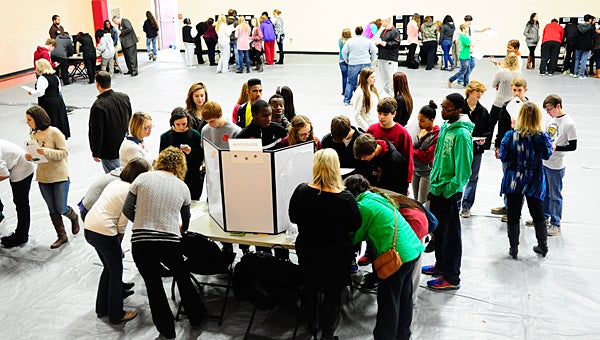How much does the real world cost?
Published 1:30 pm Friday, January 17, 2014

Students at Thompson High School learn what it takes to get by after high school during the Keeping It Real event, hosted by the Greater Shelby County Chamber of Commerce. (Reporter Photo/Jon Goering)
THS freshmen get feel for life after school
By NEAL WAGNER / City Editor
“I’m a little broke,” Machan told career technical teacher Katie Mantel as he showed her the sheet during the Greater Shelby County Chamber of Commerce’s “Keeping it Real” program in the THS auxiliary gym.
Mantel steered Machan toward the event’s housing and transportation tables, where Machan traded his brand new Chevrolet Silverado pickup truck for something a little more affordable.
“I learned not to get a new Silverado right when I start out,” Machan said with a laugh after completing the program, noting real-world expenses were “a lot more” than he anticipated. “I learned that education is worth it.”
Through the program, which the GSCCC is hosting at all Shelby County high schools this school year, students are given a life scenario and are then tasked with balancing their expenses with their income.
GSCCC and community volunteers manned tables representing expenses such as insurance, housing, clothing and groceries – all which carried prices based on Shelby County’s market.
Students also were able to choose to seek higher education – which came with tuition costs – or a second job to add to their income.
THS freshmen Tyler Couch and Sam Callahan said the class was an eye-opening experience.
“You never know how much things are going to cost, and unexpected things can happen,” Couch said, noting groceries cost much more than he thought they would.
“A lot of things are more expensive than I though they would be,” Callahan added.
Mantel and Alabaster School Superintendent Dr. Wayne Vickers praised the program, and said students had a better feel for life after high school after making their rounds to the tables.
“Yesterday, we asked them what they thought their monthly salaries would be, and they had no idea,” Mantel said, noting some students predicted they would make more than $50,000 a month. “It’s neat to see how it all comes together while they are going through this.”









